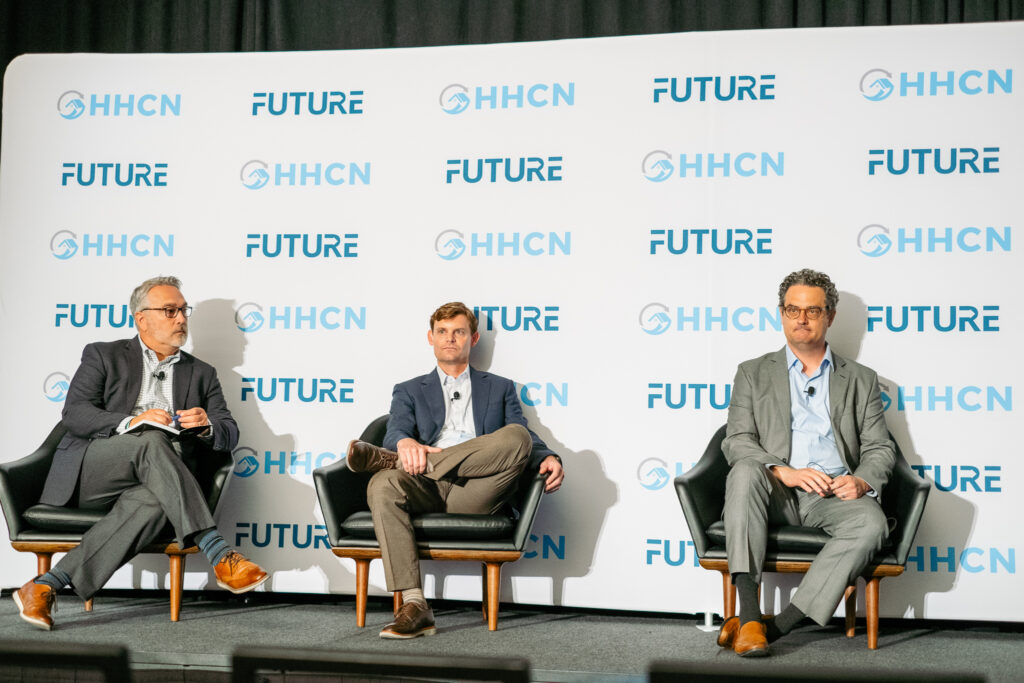While getting a fair rate is top of mind for home health providers, the ones that are seeing the most success in their negotiations with Medicare Advantage (MA) payers are selling their ability to be a solution.
Even before entering negotiations with MA plans, providers should have a clear understanding of the challenging reimbursement environment they are walking into, according to Fred Bentley, managing director at the research and advisory firm ATI Advisory.
“Reimbursement rates have really leveled off for Medicare Advantage plans, even as medical expenses have really started to grow,” he said during a panel discussion at Home Health Care News’ FUTURE conference last month. “Whereas plans, in the past, were making, in some cases, double-digit margins, they’re going to pat themselves on the back and give high fives if they hit 3% this year.”
In other words, MA plans aren’t in a generous mood, according to Bentley.
When Elara Caring prepares for MA negotiations, the company remembers to enter with a long-term mindset.
“We have to understand that as much as we want to go in there and just be frustrated with the fact that they aren’t bending to our will, and giving us the rates we want, that we’re going to be dealing with this MA plan down the road,” Brent Nash, chief development officer at Elara Caring, said during the discussion. “They’re going to be our partners in the longer-term, so you need to go in with a positive mentality that you can address a pain point of theirs.”
Dallas-based Elara Caring is a home-based care provider with about 200 locations across 18 states. The company serves more than 60,000 patients.
This focus on addressing the MA plans’ pain points has been a key strategy for the company.
“We’re going into the conversations talking about their issues, and the things that we can do to help,” Nash said. “In the environment that [Fred described], where [plans] are completely getting hammered on from an MLR perspective, if you go in there and you just say, ‘I want more money,’ they’re probably going to just laugh you out of the room. You need to say, ‘I want to help you. What’s your pain point? Are you worried about readmission or ED diversion?’”
Nash noted that providers need to sell their ability to mitigate the cost of the MA plans’ pain points, specifically.
Joe Shannon, vice president of business development at HomeCentris Healthcare, emphasized the importance of providers highlighting their differentiators during these negotiations.
“If you’re talking about some of your data and it’s aligned with all of their other current partners, that might not be enough to move the needle,” he said during the discussion.
HomeCentris Healthcare is a Owings Mills, Maryland-based portfolio of companies that offer a variety of home-based care services, including home health, personal care, therapy services and more.
One of HomeCentris Healthcare’s main MA strategies has been focusing on local and regional plans. This has allowed the company to have more face-to-face contact with decision makers.
“We’re looking for partners that aren’t just interested in membership growth and risk adjustment scores, but really folks that are looking at how we’re taking care of the patients all the way through, and really being able to change the trajectory of what’s going on with their members,” Shannon said. “We’ve had some success with local and regional [plans], having a lot of discussions, soup to nuts, about how we’re able to support their members.”
Similarly, Nash emphasized the importance of getting the right people at the table during these negotiations.
“Bringing the actuaries to the table — that’s going to be really important,” he said. “You need someone who’s got an all encompassing view of the MLR, not just the person who’s focusing on home health or [personal care services].”
Bentley believes it’s important for providers to remember that oftentimes they aren’t the priority of MA plans.
“Home health is not a top concern for Medicare Advantage plans,” he said. “They’re obsessed with hospitalizations. They’re obsessed with specialty drug costs and a few other things. That means the folks you’re negotiating with have a very narrow purview. The art of this is getting the right folks to the table without upsetting the contracting folks.”
In addition to actuaries, it’s important to get chief medical officers to the table.
“The only time we’ve seen success where home health organizations have been able to move into mutually beneficial, innovative contracts … is when you can find a chief medical officer who actually has purview into the business side of plans, or some something equivalent to a CMO who understands the clinical value of home health care,” Bentley said.
Shannon pointed out that in his company’s dealings with regional or local MA plans, there are less siloes between these various departments.
Once a provider is at the table it’s paramount that they come armed with information.
“It’s really understanding, how are those plans doing on their star ratings — that’s publicly available data,” Bentley said. “How are they doing on enrollment — that’s publicly available data. It’s really understanding those specific pain points.”
Home-based care providers are also in a position to tout their access.
“Access is a huge calling card for home health,” Bentley said. “It’s not just access, it is about taking these complex patients that are clogging up the hospital.”
Ultimately, Bentley advises providers to see the bigger picture.
“It’s being myopic around thinking, ‘Well, I’m just here to negotiate on home health, and it’s not having a bigger picture view of your impact on the Medicare Advantage members’ outcomes experience,’” he said. “It’s really understanding your bigger value prop.”




